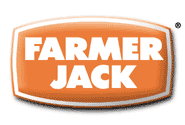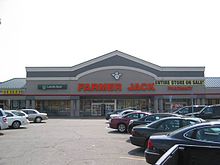
The Kroger Company, or simply Kroger, is an American retail company that operates supermarkets and multi-department stores throughout the United States.
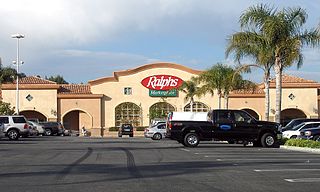
Ralphs is an American supermarket chain in Southern California. The largest subsidiary of Cincinnati-based Kroger, it is the oldest such chain west of the Mississippi River. Kroger also operates stores under the Food 4 Less and Foods Co. names in California.

The Great Atlantic & Pacific Tea Company, better known as A&P, was an American chain of grocery stores that operated from 1859–2015. From 1915 through 1975, A&P was the largest grocery retailer in the United States.

Meijer Inc. is an American supercenter chain that primarily operates throughout the Midwestern United States. Its corporate headquarters are in Walker, Michigan, which is a part of the Grand Rapids metropolitan area. Founded in 1934 as a supermarket chain, Meijer is credited with pioneering the modern supercenter concept in 1962. About half of the company's 259 stores are located in Michigan; the others are in Illinois, Indiana, Kentucky, Ohio, and Wisconsin. The chain is ranked by Forbes as the 14th-largest private company in the United States, and is the country's 21st-largest retailer by revenue as of 2020.

Harris Teeter Supermarkets, LLC., also known as Harris Teeter Neighborhood Food & Pharmacy, is an American supermarket chain based in Matthews, North Carolina, a suburb of Charlotte. As of February 2024, the chain operates 259 stores in seven South Atlantic states and Washington, D.C. Supermarket News ranked Harris Teeter No. 34 in the 2012 "Top 75 Retailers & Wholesalers" based on 2011 fiscal year sales of $4.3 billion.
SuperValu, Inc., was an American wholesaler and retailer of grocery products. The company, formerly headquartered in the Minneapolis suburb of Eden Prairie, Minnesota, had been in business since 1926. It is a wholly owned subsidiary of United Natural Foods (UNFI).

Cub is an American supermarket chain. It operates stores in Minnesota and Illinois. The company is a wholly owned subsidiary of United Natural Foods, based in Providence, Rhode Island.
Fred Meyer is an American chain of hypermarket superstores founded in 1922 in Portland, Oregon, United States, by Fred G. Meyer. The stores are found in the northwest U.S., within the states of Oregon, Washington, Idaho, and Alaska. The company was acquired by Kroger in 1998, though the stores are still branded Fred Meyer. The chain was one of the first in the United States to promote one-stop shopping, eventually combining a complete grocery supermarket with a drugstore, bank, clothing, jewelry, home decor, home improvement, garden, electronics, restaurant, shoes, sporting goods, and toys. The Fred Meyer division is headquartered in Portland.

Steinberg's was a large family-owned Canadian grocery store chain that mainly operated in the province of Quebec and later Ontario. In addition to its flagship supermarket chain, the company operated several subsidiaries across the country. The company went bankrupt in 1992, three years after being sold to private interests, after 75 years in business.
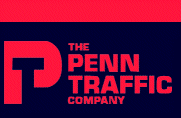
The Penn Traffic Company was a food service company founded in 1854 in Johnstown, Pennsylvania.
A warehouse store or warehouse supermarket is a food and grocery retailer that operates stores geared toward offering deeper discounted prices than a traditional supermarket. These stores offer a no-frills experience and warehouse shelving stocked well with merchandise intended to move at higher volumes. Unlike warehouse clubs, warehouse stores do not require a membership or membership fees. Warehouse stores can also offer a selection of merchandise sold in bulk. Typically, warehouse stores are laid out in a logical format; this leads customers in a certain way around the store to the checkout. For example, as one enters the store they are directed down an aisle of discounted products. From there the layout could then lead to the fresh produce department, followed by the deli and bakery departments at the back of the store. Often, certain customer service niceties, like the bagging of groceries, are not done by store employees; this helps reduce overall cost. Many warehouse stores are operated by traditional grocery chains both as a way to attract lower income, value conscious consumers and to maximize their buying power in order to lower costs at their mainstream stores.
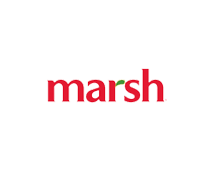
Marsh Supermarkets was an American retail food chain headquartered in Indianapolis, Indiana, with a peak number of 86 stores in 2013 located throughout central Indiana and parts of western Ohio. Its eventual parent company was Sun Capital Partners, headquartered in Boca Raton, Florida.

FreshCo Ltd. is a Canadian chain of discount supermarkets owned by Sobeys. It was launched in March 2010. As of September 2023, there were 100 FreshCo stores.

Food 4 Less is the name of several grocery store chains, the largest of which is currently owned by Kroger. It is a no-frills grocery store where the customers bag their own groceries at the checkout. Kroger operates Food 4 Less stores in the Chicago metropolitan area and in Southern California. Kroger operates their stores as Foods Co. in northern and central California, including Bakersfield and the Central Coast, because they do not have the rights to the Food 4 Less name in those areas. Other states, such as Nevada, formerly contained Kroger-owned Food 4 Less stores.
Dominick's was a Chicago-area grocery store chain and subsidiary of Safeway Inc. Dominick's distribution center was located in Northlake, Illinois, while its management offices were located in Oak Brook, Illinois.
Kessel Food Markets was an American supermarket chain based in Michigan. It began in 1981 when Owosso, Michigan, native Al Kessel, a former executive vice president of Hamady Brothers supermarkets, purchased Kroger locations in Corunna and Saginaw. Kroger closed these stores due to Michigan's poor economy at the time, and failure to reach union agreements. After Kroger closed all five of its Flint locations in 1982 for the same reasons, Kessel purchased them as well, followed by 13 Hamady stores after that chain filed for bankruptcy in 1991. At its peak, Kessel Food Markets comprised 24 stores. Kessel filmed his own television commercials for the chain, in which he would throw items into a grocery cart and state, "Save at Kessel this week. Why? Because we're with you."
Hamady was an American supermarket chain based in Flint, Michigan, United States, which at its peak had 37 stores and 1,300 employees. Given the chain's pervasiveness in the area, paper grocery bags were known as “Hamady sacks”.
Yankee Stores was an American discount department store chain begun in Flint, Michigan. Partners Joseph Megdell and Wilbert Roberts opened their first store in 1948 to sell military surplus under the name U.S. Surplus. By 1964, it had become a discount chain with 21 stores throughout southeastern Michigan, primarily around Flint. Many of its locations were paired with local supermarket chain Hamady Brothers. Some larger stores, including those in Lansing and Bay City, were called Yankee Stadium.

Lucky's Market is a brand of supermarkets that are being used by two independent and unrelated regional supermarket chains, LM Acquisition Co. LLC in Colorado and Lucky's Market Ohio in Ohio.
